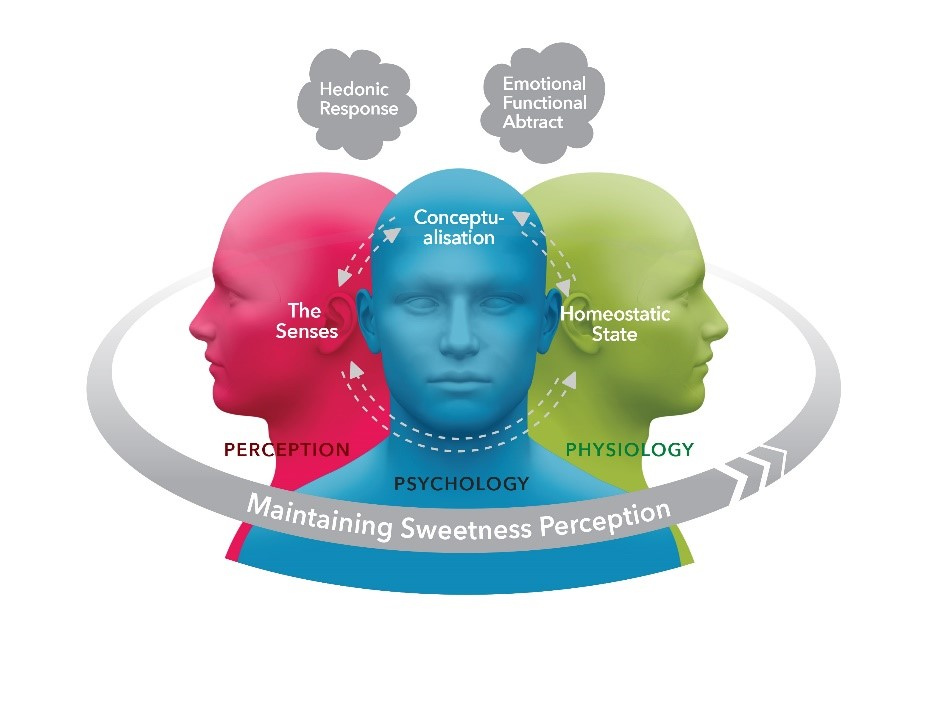Accepted abstract - Creative Tastebuds Symposium
The InnoSweet Project: Maintaining acceptable sweetness perception via an integrated sensory perception-, psychological- and neuro-physiological approach to industry-driven innovation in sugar reduced-beverages
By Derek Victor Byrne (Food Quality Perception & Society, Department of Food Science, Aarhus University, Denmark), Ulla Kidmose (Food Quality Perception & Society, Department of Food Science, Aarhus University, Denmark), Line Ahm Mielby (Food Quality Perception & Society, Department of Food Science, Aarhus University, Denmark), Per Bendix Jeppesen (Department of Endocrinology, Aarhus University Hospital, Denmark), Jørgen Deigaard Jensen (Department of Food and Resource Economics, Copenhagen University, Denmark) and Charles Spence (Cross-Modal Laboratory, Oxford University, United Kingdom)
Background: Sugar sweetened beverages (SSBs) are a main source of added dietary sugar (WHO, 2014). High sugar intake is associated with excessive energy intake and life style diseases (Vartanian et al. 2007). In beverage production there has been emphasis on reducing the sugar content using alternative sweeteners. However, many of the sugar-reduced or -replaced (SRR) beverages are not perceived as ‘identical’ to SSBs (Frank el al. 2008). Perception and acceptance of sweetness differs between individuals due to sensory psychological factors, brain-rewarding systems and physiological responses (e.g. Costel et al. 2008, Beck et al. 2014, Frank el al. 2007). Hence, these factors can be exploited as tools to model sweetness perception and acceptance of products with reduced sugar content (e.g. Dijksterhuis & Byrne, 2005, Spence, 2017).
Overall Aim: To apply a scientific-based integrated sensory perception-, psychological- and neuro- physiological (PPP) approach in industry-driven innovation of SRR-beverages enabling lower sugar content whilst maintaining acceptable sweetness perception (see Figure 1). The holistic PPP approach is important in relation to taste and choice behaviour as PPP factors as a whole affect us prior to, during and after ingestion of foods and beverages.
Methodology: -An identification of PPP-factors for maintaining sweetness perception and acceptance, -Application of this knowledge in industrial development of SRR-beverages and - A demonstration of the effectiveness of SSR beverages in terms of physiological responses and an estimate of economic and societal gain across beverage markets.
Results & Discussion: Integrated PPP factors are necessary tools in maintaining sweetness perception and acceptance of SRR-beverages. Through access to multidisciplinary knowledge on human sweetness perception in sense, mind and brain research combined with knowhow from the ingredients and beverage industries, we present an approach to apply the knowledge obtaining the right balance between health and consumer acceptance of SRR-beverages ultimately lowering the sugar intake.
 Figure 1: Integrated perception, psychology, and physiology for maintaining sweetness perception.
Figure 1: Integrated perception, psychology, and physiology for maintaining sweetness perception.
References:
- Costell E, Tárrega A, Bayarri S. Food acceptance: The role of consumer perception and attitudes. Chemosensory Perception 2010;3(1):42–50.
- Dijksterhuis G, Byrne DV. Does the mind reflect the mouth?: sensory profiling and the future. Critical Reviews in Food Science and Nutrition. 2005;(45):527-534.
- Frank GKW, Oberndorfer TA, Simmons AN, Paulus MP, Fudge JL, Yang TT, et al. Sucrose activates human taste pathways differently from artificial sweetener. Neuroimage. 2008;39(4):1559–69.
- Spence, C. Gastrophysics, The New Science of Eating, Penguin, Random House, United Kingdom. 2017, pp 336.
- Beck TK, Jensen S, Bjoern GK, Kidmose U. The Masking Effect of Sucrose on Perception of Bitter Compounds in Brassica Vegetables. Journal of Sensory Studies 2014;29(3):190–200.
- Vartanian LR, Schwartz MB, Brownell KD. Effects of soft drink consumption on nutrition and health: A systematic review and meta-analysis. American Journal of Public Health. 2007;97(4):667–75.
- World Health Organization. Guideline : Sugars intake for adults and children. World Heal Organ -WHO. 2014;48.